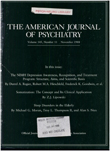Posttraumatic stress disorder, hypnotizability, and imagery
Abstract
Twenty-six Vietnam veterans were studied to determine the relationship between posttraumatic stress disorder and hypnotizability. The intensity of their posttraumatic stress disorder was measured by a self- report. Their hypnotizability scores, vividness of imagery scores, and symptomatic profiles were also ascertained. Veterans with low or no posttraumatic stress disorder scores had normal hypnotizability scores and normal imagery scores, whereas those with high posttraumatic stress disorder scores had high hypnotizability scores and high imagery scores. The authors conclude that either combat traumas enhanced hypnotic potential in some veterans or that veterans with excellent hypnotic potential to begin with were more susceptible to posttraumatic stress.
Access content
To read the fulltext, please use one of the options below to sign in or purchase access.- Personal login
- Institutional Login
- Sign in via OpenAthens
- Register for access
-
Please login/register if you wish to pair your device and check access availability.
Not a subscriber?
PsychiatryOnline subscription options offer access to the DSM-5 library, books, journals, CME, and patient resources. This all-in-one virtual library provides psychiatrists and mental health professionals with key resources for diagnosis, treatment, research, and professional development.
Need more help? PsychiatryOnline Customer Service may be reached by emailing [email protected] or by calling 800-368-5777 (in the U.S.) or 703-907-7322 (outside the U.S.).



